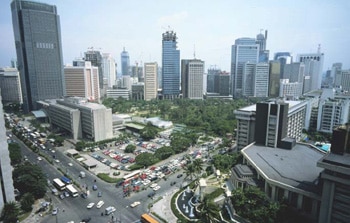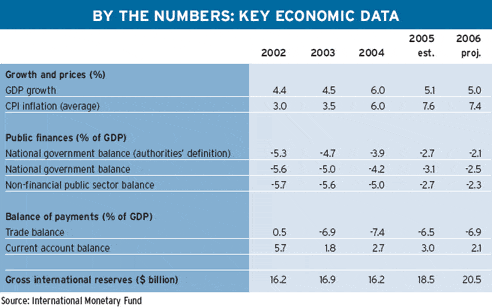Companies in the Philippines recovered quickly from the recent turmoil, and the economy continues to prosper.

Business as usual, proclaimed President Gloria Arroyo as she closed another chapter in the Philippines lengthy history of coup plots after a hectic week of emergency rule in Manila in which troops stood guard at military bases and in the streets and protesters accused the president of imposing martial law by default.
Business was, indeed, largely unfazed by the week of political turmoil that came to a close on March 6. The stock market even put on 3.3% in four trading days while the emergency was in place, perhaps helped by the fact that Arroyo turned out at the Philippines Stock Exchange while the state of emergency was still in force. But the International Monetary Fund (IMF), which coincidentally had just completed a review of the economy, released a gloomy report pointing to underlying problems, particularly related to debt, that any degree of political instability will inevitably make more difficult to solve.
It was only last October that business was looking forward to a more stable climate. Arroyo had just survived an attempt to impeach her over alleged comments to the head of the electoral commission before her election. Her government was not only promising but also implementing reforms to make the country more business-friendly. They included steps on good governance and banking standards. There were signs the changes were working. According to the central bank, foreign direct investment shot up 65% to $1.1 billion on the back of interest from the United States and Hong Kong in manufacturing and real estate. Arroyo has also made strides in cutting the deficit with new taxes and conservative spending policies. According to the Philippine central bank, the budget deficit fell from 5.3% in 2002 to 3.2% in 2005 and is projected to fall to between 2% and 2.5% this year. Growth hit 5.1% in 2005, down from 6% the previous year but still respectable. It was factors such as these that helped maintain investors confidence through the period of emergency. Theres no doubt the enthusiasm exists for an upswing.
The IMF report recognized as much. Fiscal performance in 2005 was substantially better than target, it noted, adding that the slashing of the deficit to 2.7% was well ahead of the 3.4% target. The Philippines faces two key challenges going forwardnamely, to strengthen its defenses against the remaining significant short-term vulnerabilities, and to move the Philippine economy to a higher and more sustained economic growth path, an IMF executive board assessment said. With its still high debt levels, the Philippines remains vulnerable to a sudden turn in the current benign external financing environment. In addition, further spikes in oil prices or an outbreak of avian flu pose additional near-term risks, the IMF added. It put external debt at 80% of GDP, among Asias highest. Services such as business process outsourcing, telecommunications and tourism remain key growth drivers, the IMF said, but it described electronics growth as anemic and below regional trends.
The Fitch ratings agency also warned that political turmoil would threaten economic growth. There was an urgent need to reduce the deficit, the agency said, but progress might be disturbed by political necessities. This is one of the countries where politics matter, and it is central to our assessment. Politics affect economic policy, James McCormack, head of Asia sovereign ratings at Fitch, says. He points out that the countrys rating is likely to come under new pressure. Of particular concern is the countrys fiscal position, with interest debt payments taking up almost 40% of state revenues, he explains. If effective interest rates on debt rise, more and more revenue will need to be pumped into debt servicing.
|
Economy Runs Out of Gas |
|
The coup plot came as the economy was already showing signs of slowing, largely in response to higher fuel prices and a higher value-added tax. Motor vehicle sales in February fell 13% to 6,007 units from 6,882 a year earlier, the Chamber of Automotive Manufacturers of the Philippines and the Truck Manufacturers Association said in a joint report. Inflation rose to 7.6% in February after value-added tax increased from 10% to 12%, pushing prices higher, but observers expect interest rates to remain steady. Central bank governor Amando Tetangco was unfazed by the uptick in inflation, commenting that it was as expected. In a statement, he said, This is consistent with the projected increase in inflation in the first half, after which there will be a deceleration in the second half. Global oil prices had pushed up fuel costs by 17.1% in February from a year earlier and 13.5% in January, according to the National Statistics Office. Food, beverage and tobacco prices rose 6.4% after gaining 5.6% the previous month. Astro del Castillo, managing director of First Grade Holdings, was one who welcomed the lifting of the emergency, saying investors concerns could now get back to fundamentals. Those fundamentals are still strong, says Joey Roxas, president of Eagle Equities. The appreciating peso is also helping. It attracts investors into peso assets. There are many, though, who are less optimistic, believing the fundamentals weakened when the Catholic Church won a battle for revision of a new, investor-friendly mining law. The March 10 defeat under pressure from bishops from resource-rich provinces will bring a review of the laws provision for full foreign ownership of projects and environmental standards. [We] agreed with our beloved bishops that we will review the Mining Act immediately, House of Representatives speaker Jose de Venecia was quoted as saying at the time. He promised to ask congress committee on the environment and natural resources to immediately look at the possible amendment of provisions in the mining act, throwing a pall of doubt over the sector. The new law had already achieved $500 million in actual investment by mid-2005, when it had been in force for only a year. Now investors will think again. The decision is disastrous for investment promotion, job creation and regional economic development when the Roman Catholic Church can oppose state-of-the-art mining projects, says regional mining analyst Geoffrey Gold. The government needs to do more on environmental protection, if not because of mining then because of logging. Throughout the Philippines, flash floods and landslideslike the drastic slide that hit the village of Guinsaugon earlier this year, destroying a community of 1,800are all too common. In the marketplace, consumers remain cautious, discouraged by higher taxes and inflation, and theres no doubt politics are a factor. The political situation in the Philippines is the barrier to economic growth, says one Manila executive, who requested anonymity. We all know we need credible and honest leaders who can unite all interests into working for the common good. Others disagree. Luz Lorenzo, for example, an economist at ATR Kim Eng Securities, has been quoted as saying, What the world seemed to miss is that the stock market didnt plunge, the peso didnt collapse, and bond yields didnt shoot up. Manila does plan to silence its critics by pumping additional revenue from the higher VAT into financing priority infrastructure projects and social programs. Tighter fiscal supervision by the central bank, government pump-priming and the enthusiasm of business to get out of the rut may still prove that politics need not affect everything in life. 
|



